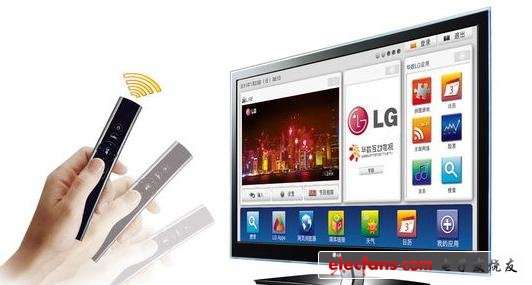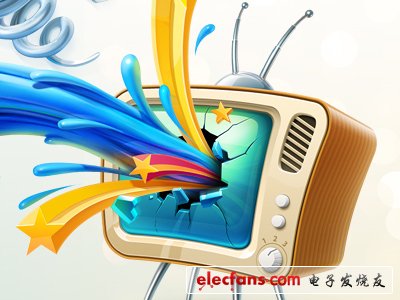For the smart TV industry, there is now a bottleneck. Simple TV can no longer attract the interest of users, and the Internet and smart aspects have not been supported by the State Administration of Radio, Film and Television, and even suppressed. At the same time, due to various mobile With the impact of equipment and computers, the current state of television is not optimistic. Like mobile devices, many manufacturers are currently focusing on the hardware war of smart TVs. But there is no way out to simply compare the hardware, only experience is the real core of smart TV.

Smart TV blows the "dual-core" wind
The "nuclear war" storm of smartphones has now spread to smart TVs.
Recently, LeTV and CCTV broadcast control platform released the industry's first 1.5G dual-core TV box C 1. Yang Fang, senior vice president of LeTV, said that smart TV will be the focus of LeTV's future development. To this end, LeTV has launched a number of high-end smart set-top boxes for the TV stock market; for new markets, LeTV will launch its own brand "Super TV" next year.

In the smart TV industry, LeTV is just a newcomer.
At present, the TV is no longer just a household appliance for watching TV series, watching videos, and playing simple games. Consumers expect to get more extreme, more exciting effects, richer applications, faster processing, and more interactive interaction on the TV. Experience, but the existing single-core processors on the market can no longer meet their diverse needs.
It is understood that most of the single-core smart TVs introduced by most manufacturers before appear to be stuck or frozen when playing games and watching movies. For smart TVs to have better content and more applications, they must rely on one or more "hearts" with powerful computing capabilities.
To this end, many color TV manufacturers no longer compete for image quality performance, but for the computing power of integrated circuit chips such as CPU and G PU. Like PCs and laptops, they fight in terms of frequency, multi-core, and memory size.
As early as March this year, Samsung released its first smart LCD TV equipped with a dual-core processor in the Chinese market. Users can complete gesture remote control and voice remote control. Since then, many domestic color TV manufacturers such as TCL, Hisense, Konka have also launched smart TV products equipped with dual-core CPUs.
With the concerted efforts of many manufacturers, dual-core smart TVs have become a batter.
It is understood that the biggest benefit of dual-core smart TVs is "more powerful computing power." Due to the fast processing speed of dual-core TV, it can bring consumers a more ideal user experience. Some people in the industry believe that it is likely to become an important development direction for smart TVs in the future, and with the development of information technology, future dual-core and multi-core TVs are expected to become the mainstream configuration in the TV field.
Yang Bin, vice president of T CL Multimedia and president of China Sales Company, said that the current global color TV industry has entered a stage of pan-IT development, and dual-core technology will become the technical trend and development inevitability of the global color TV industry. He believes that as society enters the era of great entertainment, color TVs are no longer just a household appliance terminal for watching TV and playing simple games. Consumers hope that the smart cloud TV experience can be more extreme, the effect is more exciting, the application is richer, and the processing is more Quick, interactive personality.
"Dual-core TVs have a fast processing speed and are likely to become an important development direction in the future." Chen Quanquan, deputy manager of the fashion electronics market department also said, but he said that the current dual-core smart TVs are still mostly in the conceptual stage, not yet the market The absolute focus of the key depends on whether it can meet the needs of the market in the future.
A more optimistic view is that as the competitiveness of dual-core or multi-core smart TVs increases, the price of dual-core or multi-core TVs will be appropriately lowered under the competitive landscape of brand leaders, thus rewriting the smartphone market, "Of course, with With the further enhancement of functional integration, smart TVs may even replace desktop computers in the future. "
Traditional color TV industry will only enter the dead end with hardware
At present, the most active domestic smart TVs are traditional color TV manufacturers such as TCL and Skyworth.
Compared with most products (smartphones, tablet computers, various industrial embedded devices) using ARM smart CPU, the biggest difference of smart TV is that the screen is huge and the amount of information that can be carried is huge. At the same time, consumers' diversified demand for color TV applications is not lost to other devices, which makes color TV products have higher requirements for the basic performance of processors.
Obviously, upgrading hardware has become a major outlet for traditional TV manufacturers. After all, for them, the construction of software and applications is not easy, but the hardware is its own strong point.
However, the industry has expressed its views on the traditional smart TV competition hardware.
First of all, the famous "Moore's Law" of the IT industry is significantly changing and affecting the development process of the smart TV industry.
Moore's Law was proposed by Gordon Moore, one of the founders of Intel. Its content is: When the price is unchanged, the number of transistors that can be accommodated on the integrated circuit will double every 18 months, and the performance will double.
This empirical law is considered to be the most "lively description" of the pace of development of human computers and information technology. As a smart TV that relies on integrated circuit chips, it naturally follows this basic law. In this way, the update cycle of smart TVs will be greatly accelerated, just as smart phones update from "single core" to "dual core" and "quad core".
However, from the current point of view, it is far from possible for smart TV to do this. The biggest difference between smart phones and smart TVs is that these two are not products of an update cycle. For the vast majority of ordinary households in China, the replacement of most TVs should be more than five years. More importantly, TVs, as one of the necessary home appliances, are more choices than other digital products in purchasing options. careful.
In addition, the IT-based color TV market means more fierce, brutal and rapid market competition for traditional color TV companies, which means that the color TV companies have completely disappeared as the "technical core" position of these products ----- Take the dual-core smart TV as an example. The display screens of most color TV companies are bought, the CPU is bought, the memory is bought, and the operating system is also authorized by others: in a dual-core smart TV, the core components are the core Most of the technology comes from outside color TV companies.
Nowadays, semiconductor manufacturing, IC research and development, OS design, software, content and services, LCD panel industry ... These have become the upstream partners of smart TV "inseparable". The task of color TV companies is to assemble these upstream products and technologies safely and steadily, and then sell them to consumers, and be responsible for after-sales service-this is the fate of the simplest "smart TV hardware" manufacturers.
Therefore, Hong Shibin, vice chairman of the China Household Appliances Marketing Committee, said that the current practice of smart TV manufacturers only fighting for hardware will not last long. He expressed the hope that smart TVs will not follow the old road of traditional color TV industry. Nowadays, simple hardware-based competitions such as "dual-core" have unconsciously introduced smart TVs into the traditional color TV industry's trajectory: price wars have damaged industry profits, and production companies have shouted at a loss. If this continues, the smart TV industry will enter a dead end.
Experience is the core of smart TV
Compared with the high-speed popularization of smart TV, the real application of smart TV is not optimistic. Zhou Houjian, chairman of Hisense Group, revealed during the "two sessions" in 2012 that the access rate of smart TVs was only 40%, while the statistics of relevant persons in the China Electronics Video Industry Association were lower. Less than 10%).
All of this may stem from consumers' dissatisfaction with the current performance of smart TVs: users want to be able to access the information they need at any time to satisfy their viewing pleasure, but smart TVs are currently unable to do so.
In fact, most manufacturers still have little understanding of the "interpretation" of smart TVs: "Smart TVs have a fully open platform, equipped with an operating system, and users can install and uninstall software, games and other third-party services by themselves. The program provided by the manufacturer continuously expands the functions of the color TV through such programs, and can surf the Internet through network cables and wireless networks. It can expand the peripheral hardware of the standard interface, input devices, and even work with more computing devices. " .
It is obviously not enough to use such "explanation" to make a real product and guide consumers to apply it.
What does the future of smart TV, or TV and color TV look like?
The industry believes that the fundamental factor that can answer this question should be the consumer, not the technology; it should be the human factor, not the physical factor. Because the purpose of human creation or use of any technology is nothing more than to serve oneself, but to make one's life more convenient. In other words, the future of smart TV will depend on consumer choice.
Therefore, Luo Qingqi, a home appliance expert and senior director of Paler Consulting, said: "The problem of smart TV landing is not hardware, but 'software'. The goal of intelligence is to allow users to obtain more information, change the past must see the same at the same time In the form of content, users on demand replace passive watching. "
This means that color TV companies should shift from developing higher-tech products as much as possible to providing consumers with the most accurate products; consumers' buying habits have also changed from pursuing advanced products as much as possible to pursuing products that are "best for themselves."
In this regard, Hong Shibin also believes that excessive attention to the popularity of smart TV will instead cause the entire industry to be kidnapped by "smart hardware" and lose its true understanding of "smart"-this correct understanding should not be "hardware" How high is the performance and how comprehensive are the software applications? Instead, it should be "more flexible to meet the needs of different consumers" rather than the improvement of rigid performance indicators. Therefore, any concept that does not aim to improve the user experience is hype. Without a huge improvement in user experience, the smart devices are all multi-function devices.
-
Voltmeter Display,Mini Voltmeter Display,Digital Panel Voltmeter,Voltmeter Lcd
Dongguan Andu Electronic Co., Ltd. , https://www.idofuse.com